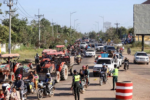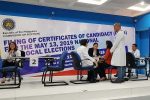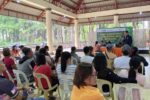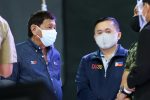SC junks petitions vs. Marcos candidacy
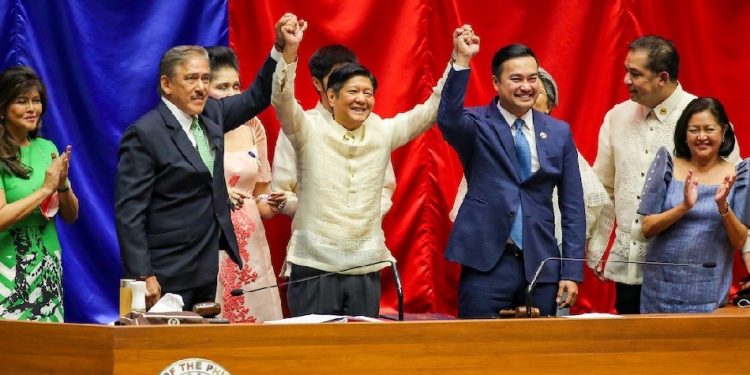
Ferdinand “Bongbong” Marcos Jr. during his proclamation as president-elect of the Philippines, a formal ceremony officiated by Senate President Vicente Sotto III (L) and House Speaker Lord Allan Velasco at Batasan Pambansa complex in Quezon City. Photo
By voting 13-0 with two justices taking no part, the Supreme Court junks the petitions challenging candidacy of president elect Ferdinand “Bongbong” Marcos, Jr’s, two days before he takes his oath as the country’s 17th leader.
The high court dismissed the cancellation of certificate of candidacy and disqualification cases filed by civic leaders and martial law survivors.
Associate Justice Antonio Kho inhibited because he participated in resolving the petitions when these were still at the Comelec. The magistrate is a former poll body commissioner.
Justice Henri Jean Paul Inting also took no part because his sister, Comelec Commissioner Socorro Inting, was involved in resolving the same petitions at the commission.
The dismissal was based “on the merits” with all the issues resolved and not simply on the basis of mootness, The high court said during a press briefing.
Mootness is a procedural ground for dismissing a petition because legal actions can no longer be brought or continued as it has been resolved. For instance, Marcos has been proclaimed president-elect by the National Board of Canvassers.
The Supreme Court ‘sustained and expounded Comelec rulings” such as the one saying that non-filing of income tax returns does not amount to moral turpitude.
A 1997 Court of Appeals ruling affirmed Marcos’ conviction for non-filing of income tax returns from 1982 until 1985.
Record shows that Civic leaders led by Fr. Christian Buenafe and represented by former Supreme Court spokesperson Theodore Te sought to cancel Marcos’ Certificate of Candidacy due to material misrepresentation when he supposedly claimed, under oath, that he was eligible to run for the presidency despite having been convicted of tax violations, which, they argued, disqualified him from running.
Another group of Martial Law survivors, the Campaign Against the Return of the Marcoses and Martial Law (CARMMA) represented by lawyer Howard Calleja, wanted the high court to declare Marcos disqualified because of his repeated failure to file income tax returns from 1982 to 1985 amounted to moral turpitude, a ground for disqualification.
They claimed the National Internal Revenue Code imposes the penalty of perpetual disqualification on a government official found guilty of violating the Tax Code.
They also argued the Court of Appeals ruling, which modified the regional trial court’s conviction of Marcos for non-filing of tax return, should not have removed the jail term which was beyond 18 months, another ground for disqualification.
Marcos said the failure to file an income tax return is not a crime involving moral turpitude and the NIRC rule imposing perpetual disqualification on government officials found guilty of violating the Tax Code did not apply to Marcos as it came into effect only in 1986, after the supposed violations.
The incoming president also argued there was nothing in the 1997 CA ruling which imposed a jail term.
He added, he could not have misrepresented something that legal experts are still debating on.
Both petitions, earlier rejected by Comelec, wanted the SC to declare as president outgoing Vice President Leni Robredo, having supposedly obtained the highest “valid” votes during the elections.
The Senate and House of Representatives, sitting as the National Board of Canvassers, proclaimed Marcos winner of the 2022 presidential polls with 31.6 million votes.
Behind him, Robredo obtained 15 million votes.
Marcos is the first president to obtain more than 50 percent of the votes cast in recent history.
Opposing both petitions, Marcos said the voice of the 31 million Filipino voters should be respected.
